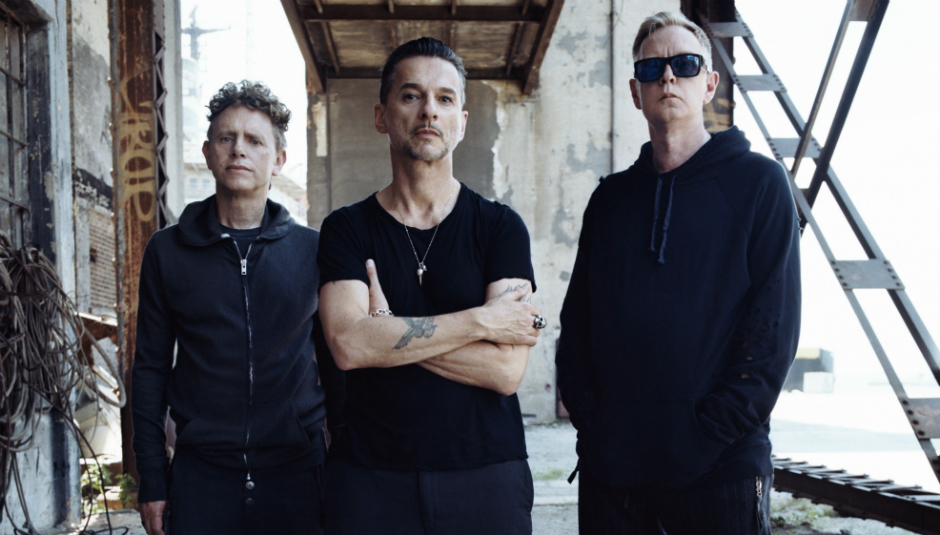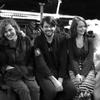Throughout their 37-year career, Depeche Mode have always taken you on a trip to a New Life, into a Strangelove or straight to Heaven and the route they’ve chosen – bubblegum synth-pop, industrial krautrock or electro-gospel blues –has never been mundane. For their latest album, Spirit, the band have driven headfirst into a socio-political terrain many of their contemporaries would likely swerve. Heralding their return with the uncompromising single ‘Where’s The Revolution’ Depeche Mode sound at their most energised and pertinent in years.
On the Tuesday afternoon at a central London hotel, Depeche Mode’s animated American manager says the guys are in “good spirits” (completely oblivious to the pun she’s just made) as she whisks me into a serenely white hotel room. Martin Gore is sitting by the window in the haze of a London spring day; he smiles as we shake hands with the same crooked boyish half-grin first glimpsed when the band made their Top Of The Pops’ debut, resplendent in Soho’s finest leather, back in 1981. He is, as promised, in a great mood with a warmth that makes you feel instantly welcome and at ease; he’s enthused about the band’s recent show for BBC 6 Music at the Glasgow Barrowlands (“just walking around we met people from all over the world who had come there to see us”) and eager to talk about the band’s new album.
Gore, who now lives in California, first started writing the lyrics for Spirit in late 2015 when he watched Trump’s blonde bouffant first hitting the initial winds of the US presidential campaign trail. “The American electoral process does go on for a long time and that was already underway; that is a circus”, he explains wearily. “You do lose faith in humanity just watching it unfold’. At the same time, the Syrian Civil War was intensifying and images of the subsequent refugee crisis were filling our screens – a situation Gore found difficult to watch. “Seeing the images on a daily basis coming from Syria it seemed, I know it’s a very complicated situation, but how can humanity not come up with a solution for it?”
It was this questioning of humanity that was to form the backbone of what would be the band’s fourteenth album. ‘Going Backwards’ opens the album lamenting a society with a gear stick pushed into reverse, ‘Poorman’ holds a mirror up to economic inequality and closer ‘Fail’ unceremoniously declares, “We’re fucked”; it’s an impassioned and honest plea to a world spiralling out of control. “I’ve never been religious in any way, but a lot of my songs have dealt with spirituality and somehow we’ve lost our spiritual way at the moment”, Gore says with his green eyes wide open with a sense of urgency. “We need to find it quickly because for a start we’re going to reach a tipping point very soon when there won’t be a planet”
For his songs Gore has always delved into the contradictory nature of the human condition: love, hate, sexuality, jealously, inequality, compassion, addiction, redemption along with a good dollop of kink have all formed the basis of Depeche Mode’s most well-known tracks. In this way Spirit hasn’t marked a dramatic departure in Gore’s lyrical landscape, however Spirit has a political directness not seen by the band since the 1980s – a decade eerily similar to the peril and uncertainty we now find ourselves living in.
Construction Time Again, the band’s third album released in 1983, made a career-defining break from the sugar coated pop roots planted by founding member Vince Clarke; the record drew on the poverty Gore had seen during a trip to Thailand as well as the common fears of the era; ‘Two Minute Warning’ heralded the threat of nuclear war and classic ‘Everything Counts’ chided the greed of capitalism with a radio-friendly chorus. At the time Gore refused critics labeling of the album as a political statement, telling the Melody Maker it was “common sense”. Like on Spirit the lyrics were never political in a politics with a capital ‘P’ sense, but more observations of an unjust world through Gore’s eyes. After the album, Gore touched on socio-political themes briefly on its predecessor Some Great Reward with ‘People Are People’ and then ‘New Dress’ from 1986’s Black Celebration, but no record released by the band until now took on social politics in the same way.
Asking Gore if he was nervous about the release of Spirit he’s pretty candid. “When I first started writing songs I was a little bit worried that the direction I’d decided to take could backfire,” he says with a nervous laugh. “It’s a balancing act if you decide to make an album that’s political, for want of a better word, because you can get slated for it.” The critical reaction to the Spirit, Gore adds, has largely been positive with him reading only one “slightly negative” review; the album hit the top five in both the UK and US album chart. In a bittersweet serendipity, the record’s symbiosis with the current zeitgeist made it resonate with listeners in a way he could never have imagined. “I don’t know what made me decide what to do it when I did, but the timing I think has been perfect for us,” he says somewhat uneasily. “The world I thought was in a terrible mess two years ago is in an even worse mess now.”
The question of whether musicians should get involved in politics is always being asked, but even more so than when politics lurches violently to the right. Scouring through reviews before our interview the only “slightly negative review” of the album I find is from Pitchfork; the reviewer couldn’t fathom how a successful rich band could comment on those on the bottom rung of society, condescendingly saying about the track ‘Poor Man’: “Gore and [Dave] Gahan risk coming off as oblivious to the irony when they observe that 'Corporations get the breaks / Keeping almost everything they make'."
When I quote this part of the review to Gore it’s the only time in the interview he becomes visibly agitated and gives one of his most in-depth answers. “There’s the song ‘Eternal’ which I wrote for my daughter. When I wrote it, it’s almost like an interlude and it’s almost like black comedy; there’s a bit in it where the black cloud rises and the radiation falls. When somebody brought this up with me before I was saying, unfortunately, we are in a time when we have to worry about nuclear weapons again. We have a madman in the White House who, that week when I did the last interview, had made comments saying sanctions were no longer an option with North Korea and I was saying, ‘What’s the next step?’ If there is any nuclear war I get affected too and it’s the same with the environment.”
Coming back to the original point of being seen as, for want of a better phrase, a champagne socialist Gore response is defiant. “‘Poor Man’ people could say, ‘OK, how could you say that? But I agree in paying taxes and I would be quite happy to pay higher taxes. I think huge multi-national corporations should be paying tax and they should be paying large amounts of tax; I don’t think it’s right to do a deal with a country and not pay tax.” ‘
'Poor Man’ does feature some classic Gore lyrical clangers but, as always with his previous generalised lyrical observations, the intention is good; as a band who started out as four working class boys from Basildon in Essex, who used to carry their heavy synths down on the train to London to try and get their break, Gore is only too aware of the impact of the growing divide between rich and poor in society. “I think we came up at a really fortunate time as if we started today it would be a complete struggle,” he says. "The music industry kind of exists, but just for a few people…only people who have money can afford to make records because record companies are not paying for it anymore.”
Throughout the interview though Gore is keen to stress the album is not 49 minutes of the band preaching; the knowing irony of Dave Gahan, Andy Fletcher and Gore stood atop of a soap box in the ‘Where’s The Revolution’ video is not lost. When I ask him what he wants listeners to get out of the album he’s clear of his ambition. “I think with all of our music I want people to think when they listen to it. I don’t know if they’ll ever change their opinions maybe they won’t, but it can least make them think and if it can do that maybe there are a few people that much change their opinions”.
Spirit is a landmark album for Depeche Mode for more reasons than its lyrical transgression; it’s the first album in 12 years not produced by Ben Hillier as the band opted instead to team up with a new producer, James Ford (one-half Simian Mobile Disco). Unlike Hillier’s clean production, Ford reintroduced the intense and varied textures reminiscent of the band’s seminal album Music For The Masses: ‘Going Backwards’ has a muscular throbbing beat to mirror the track’s message, ‘So Much Love’ has an unstoppable euphoric momentum, and the outro to ‘Cover Me’ transverses the cool air of Kraftwerk’s Autobahn.
Ford’s production effortlessly pulled together the dissonant strands of the band’s sound to make them effortlessly cohesive. Recommended by former Mute label boss and close friend of the band, Daniel Miller, the pairing with Ford couldn’t have been more fortuitous. “We definitely have to give James some credit,” Gore proffers. “Whenever I say this it sounds so obvious, he’s so talented with a sound picture. He could mix some basic thing we had going and it would immediately sound finished, which is an amazing talent.”
With the band obviously open to change I sneakily ask if there’s any chance of them reuniting with Alan Wilder; the band’s former keyboardist and producer abruptly left in 1995, “due to increasing dissatisfaction with the internal relations”. It was a year before Dave Gahan’s near-fatal overdose and the closest point the band ever came to breaking up. The response from Gore is hilariously blunt. “We never think about it to be honest; I know that will upset a lot of fans. I think it’s a bit like kids who come from a completely dysfunctional divorced family who have this crazy notion that their parents should get back together,” he says with mock astonishment. “We’ve met Alan over the years and we get on with Alan. He decided to leave in 1995, and he’s never reached out to us and said he wanted to rejoin; we get on quite well without him so it’s never come up.”
One member of Depeche Mode’s extended family who is thankfully going nowhere is long-term creative partner Anton Corbjin; his signature black and white minimalist finesse graces the album artwork for Spirit, the band press shot featuring a sledgehammer similar to the Construction Time Again cover and the silent film humour of the ‘Where’s The Revolution’ video. Corbjin’s influence on the bands is still treasured by Gore: “He’s been very heavily involved in everything we do visually... He’s been hugely important for our image.”
The seriousness of his answer slips as Gore, with a playful grin, recalls an anecdote Corbijn recently shared with him of why he decided to work with the band. “We worked with him once in 1981 when he did a cover for the NME and we tried to work with him after that for a few years and he wasn’t interested; I don’t blame him as we were making very bubblegum pop music early on in our career.” Gore explains. “When we asked him in 1986 to do a video for ‘A Question Of Time’ he agreed and we were a little bit shocked. He admitted to us recently that the only reason he agreed to do it was because he fancied shooting a video in America!”
This month the band kicked off their Global Spirit tour in Stockholm, which will see them go on to play to an astounding 1.5 million fans in 32 cities in 21 countries across Europe alone including a date at the London Stadium on 3 June. During the interview, Gore is keen to get across that the band is here to do what they’ve always done best - perform. “We’re entertainers and we’ve happened to make this record and we’re talking about these points, but when it comes to the tour, we’re going out and hoping to entertain people for two hours”.
The BBC 6 Music show at Glasgow Barrowlands around the album’s release was a thrilling testament to this unquenchable showmanship: all sing-a-long earworm choruses, searing synths, and Gahan signature crotch thrusts. Fans, as Gore says, had come from all around the world to see the show and it’s a dedication he doesn’t take for granted, even after over three and a half decades on and off the road. “We are really spoilt by our fan-base. The concerts are always special events; every single night they’re always going to sing… It’s fun to actually go onstage and you get a lot of love back.”
One fan they definitely don’t want the love back from is everyone’s favourite neo-Nazi punching bag, Richard Spencer. Earlier this year Spencer told New York Magazine that, “Depeche Mode is the official band of the alt-right”. Initial reactions were that the white nationalist must have skipped ‘People Are People’ on his playlist; Dave Gahan came out with a more succinct response in an interview with Billboard and called Spencer “a cunt”. When I ask Gore if he’s sent Spencer a copy of the album with the track ‘Scum’ underlined, he’s still baffled by the whole experience. “That was a very strange day when we heard that news. We were confused and just had no idea why he went there.” He pauses thoughtfully for a second before adding, “he’s most probably mad.”
Mad men aside, Gore is excited to get back on the road and with 14 albums in their back catalogue, the biggest challenge is picking the set list. On their last tour, the band came up with a cheeky fail-safe way to dodge picking what to play as Gore explains. “All of us threw songs into a hat and said, 'We might do these' and gave them to our programmer. It was just too much, he ended up combusting!” Gore says with a chuckle. “Luckily this time Dave took it upon himself to put a basic set together, which we just then slightly tinker with so we had a set quite early on.” It’s a set that like with everything else the band does puts the fans first. “We have to play some tracks from the new album and then keep people happy by playing stuff from throughout our career”.
On the tour, the band are continuing their long-term support of charity:water - a non-profit organization that provides clean and safe drinking water to people in developing nations. “We decided to support charity:water on the last tour and we did this partnership with Hublot [a Swiss Luxury watchmaker],” Gore explains. "We raised a lot of money, it was 1.4 million dollars. charity:water has a new thing called The Spring which is a monthly donation thing. We’re hoping by promoting them, by showing their films before we go on stage to engage more fans on a monthly basis.”
As his manager comes in to close the interview and we all laugh nervously about Trump’s latest gaffs, as a final question I ask Gore if after 37 years together he can imagine the band doing a Stones and playing shows well into their seventies. “One of the good things about us is that we don’t ever plan too far ahead,” he says. “We know we have this tour ahead of us and it will go on until at least next March and possibly longer than that, and beyond that we’ll take a break and we’ll just see what happens. I always say I don’t mean that to sound negative, because I think I’ve been saying that since 1986.” Before poignantly adding, “we might not have a world in four years.”
Spirit is out now via Mute. Depeche Mode play the London Stadium on 3rd June.
Photo credit: Anton Corbijn






















